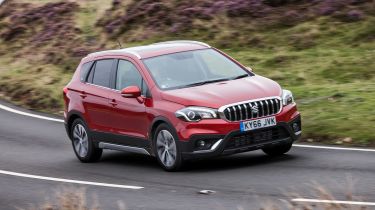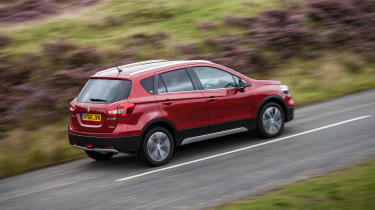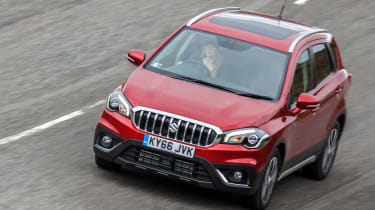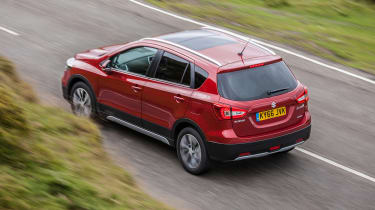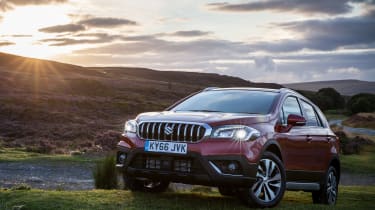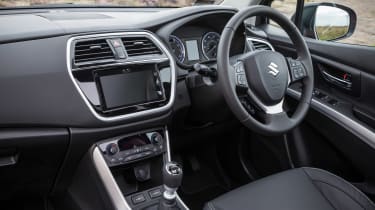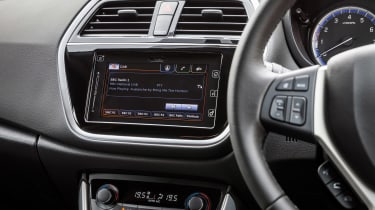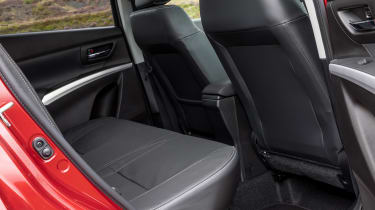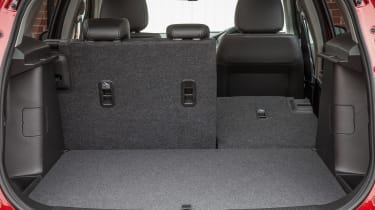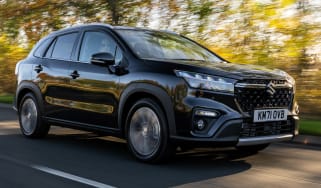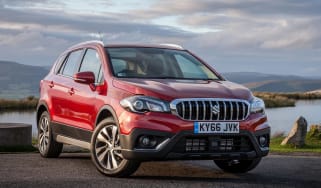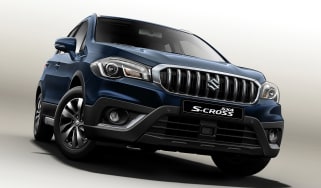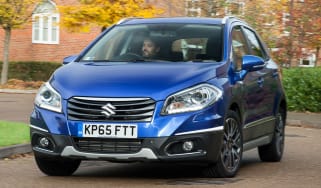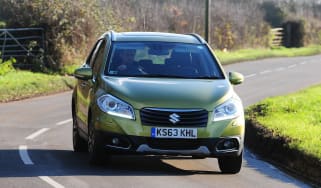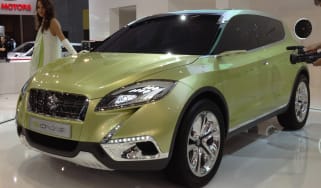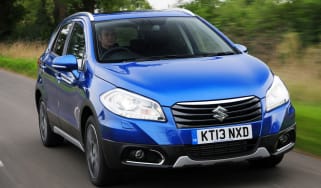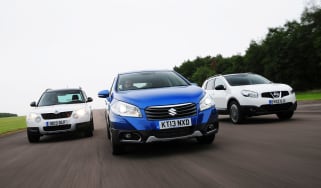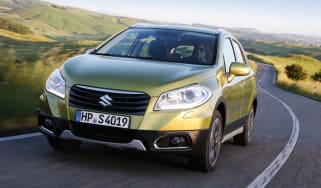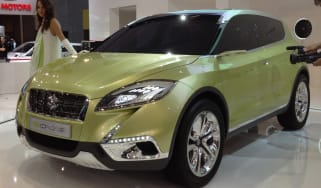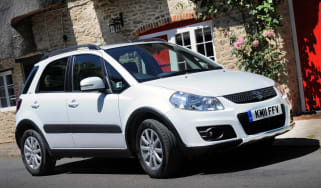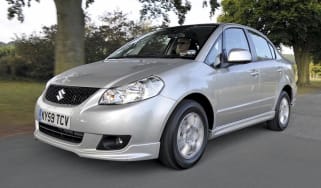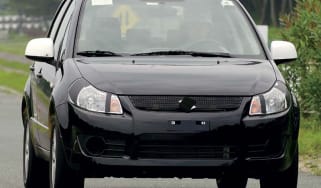Suzuki SX4 S-Cross review
A 2016 facelift for the Suzuki SX4 S-Cross may have changed the styling, but it remains a great value crossover that's decent to drive

Suzuki’s SX4 S-Cross has been around since 2013, and since then the crossover and SUV market has grown exponentially. Nearly every mainstream manufacturer is now fielding a competitor in the segment, and even Suzuki itself now has the slightly smaller Vitara on its books.
It all meant that the S-Cross was getting left behind but a substantial facelift for the 2016 model year aimed to bring the car back into the limelight. Suzuki worked to improve the old car’s anonymous hatchback-like looks and give it more of an SUV stance with a bold new front end. It also sits 15mm higher off the ground than before. The plan is to help it compete with pricier crossovers such as the Nissan Qashqai, Honda HR-V, Renault Kadjar and Vauxhall Mokka X.
• Best crossovers and small SUVs
There are improved cabin materials and a new infotainment system, plus new features like a reclining seat backrest in the rear. The old 1.6-litre petrol engine was ditched in favour of two turbocharged units found elsewhere in the Suzuki range; a 1.0-litre three cylinder and a 1.4-litre four cylinder. The 1.6-litre diesel remained untouched and the S-Cross can still be had with either front-wheel drive or Suzuki’s ALLGRIP selectable four-wheel drive system.
There are three trim levels on the Suzuki SX4 S-Cross. Entry-level SZ-4 spec is only available with the 1.0-litre turbo petrol engine and comes in at under £15,000. Standard equipment includes 16-inch alloys, a DAB radio, Bluetooth, cruise control, electric heated mirrors and air-con.
Used - available now

2023 Land Rover
Range Rover Evoque
52,458 milesAutomaticPetrol2.0L
Cash £20,800
2020 Jaguar
F-Pace
60,690 milesAutomaticDiesel2.0L
Cash £22,287
2021 Mercedes
A-Class
24,508 milesAutomaticPetrol1.3L
Cash £18,200
2020 BMW
5 Series
55,000 milesAutomaticPetrol2.0L
Cash £13,700Move up to SZ-T spec and you can choose from all three engines, while standard kit includes 17-inch alloys, sat-nav, front and rear parking sensors with a reversing caper, dual-zone climate control, auto lights and wipers, keyless entry and an upgraded stereo system.
• Suzuki SX4 S-Cross 1.0 BoosterJet review
Top-of-the-line SZ5 is only available on the 1.4-litre petrol or the diesel, and comes with equipment such as leather upholstery, adaptive cruise control, a panoramic sunroof and heated front seats.
Suzuki knew its SX4 S-Cross wasn’t the most memorable car in an extremely competitive crossover sector, and the 2016 facelift aimed to address that. The more muscular SUV styling and chrome grille will divide opinion, but the rest of the car is an improvement on what was already a good value package.
The S-Cross’ relative lightness benefits it on the road, meaning it feels agile and responsive, while improvements to the suspension soften the ride. The engines provide peppy performance and decent efficiency – the new 1.0-litre turbo petrol being a particularly strong offering. Refinement still isn’t a strength, however, and despite improvements, the interior could be more solid and plush. At least there’s no shortage of space and equipment on offer.
Given that it’s considerably cheaper to buy than a Nissan Qashqai, it’s easy to overlook the Suzuki S-Cross’ foibles and appreciate how much car you get for your money.
Engines, performance and drive
The Suzuki SX4 S-Cross is competent rather than exciting on the road, but the same goes for most cars in this class. It’s actually quite a sharp drive by crossover standards – like its smaller Vitara sibling, it’s been set up to handle like a regular hatchback rather than an SUV.
The main reason for the impressive dynamic abilities of the S-Cross is that it’s considerably lighter than most competitors – it weighs as little as 1,160kg, which is barely more than most superminis. As a result, it feels agile and light on its feet, helped by steering which is accurate and has good weighting to it. It’s grippy and easy to place on the road with slick controls, although you can notice body roll at speed. A Mazda CX-3 is more composed, but the Suzuki is still a pretty good drive. The lightness also means that the engines rarely struggle to shift it.
Before the 2016 updates, that good handling came at the expense of the ride quality, which was unsettled and firm. For the facelift, Suzuki not only raised the ride height by 15mm but also revised the suspension settings to improve stability and comfort. It’s less bumpy as a result, although sharp potholes and low speed ruts still unsettle it more than the best in this class. Road and wind noise are noticeable at high speed too.
Suzuki's ALLGRIP selectable four-wheel drive system is available with both petrol and diesel variants. That's a bigger range of choice than most rivals, which tend to get four-wheel drive only with the flagship diesel models. The system works very well on muddy tracks, and the extra ground clearance helps, but the system asks for a small performance and weight penalty.
Engines
The most important addition to the latest Suzuki S-Cross is found under the bonnet. Previously, the only petrol engine choice was a naturally aspirated 1.6-litre unit, producing 118bhp and just 156Nm of torque. It felt gutless at low revs, needing to be worked hard to get the best out of it and refinement suffered as a result.
Now, though, the entry-level petrol is Suzuki’s peppy new 1.0-litre ‘Boosterjet’ three-cylinder unit. It’s got marginally less power but more torque available far lower down the rev range, meaning it feels sprightly right from the off. 0-62mph takes eleven seconds, but it feels faster than that, and as you drive you’re accompanied by a tuneful three-cylinder engine note. It’s considerably more efficient than the old engine, too. The only downside is that you’re stuck with a five-speed manual gearbox.
The other petrol choice is a turbocharged 1.4-litre unit, mated exclusively to the ALLGRIP four-wheel drive system. Producing 138bhp and 220Nm of torque, it feels pretty brisk in a car as light as the S-Cross. Not only is it very strong, but it’s also smooth, revving out keenly and quietly. A sixth gear for the manual model aids cruising economy and makes it more refined at speed, while a six-speed automatic gearbox is also available. We’d say either of the new petrols are the ones to pick depending on how much performance you need.
That’s not to say the diesel is bad in any way. It’s the same 1.6-litre unit as the old car, producing 118bhp and 320Nm of torque. It’s relaxing to drive and quite quick, with a six-speed manual gearbox to make motorway driving more civilised. It’s not the quietest unit around, however. Suzuki dropped the option of the dual-clutch automatic gearbox from the S-Cross due to slow sales.
MPG, CO2 and Running Costs
The S-Cross is the largest model in Suzuki’s UK line-up, but it’s still inexpensive to run. Whichever model you choose, you should get a reliable car that’s cheaper than its rivals to buy and on a par with them on ownership costs.
Despite the new petrol engines for 2016, the diesel is by far the best for those doing long distances. It manages a strong combined economy figure of 68.9mpg in front-wheel drive form, with CO2 emissions of 106g/km. Expect over 50mpg most of the time in the real-world. That’s competitive with the best in the class, but not outstanding.
Be aware, though, that the addition of four-wheel drive harms emissions and economy a bit, dropping the combined figure down to 64.2mpg and bring CO2 up to 114g/km. It’s not drastic, but does put the S-Cross in a higher tax band as a result.
The new petrol engines are pretty frugal on paper, and mostly impress in the real-world, too. Whereas the old 1.6 barely scraped 50mpg combined, the 1.0-litre turbo claims 56.5mpg and emits just 113g/km of CO2. The 1.4-litre turbo petrol sees that drop to 50.4mpg combined and 127g/km, although given the standard-fit four-wheel drive system that’s not bad at all.
Insurance Groups
While the Suzuki S-Cross is cheap to buy, it’s relatively pricey to insure. Now the 1.6-litre petrol engine has been ditched the range starts at group 16, rising to 20 for the diesel and 21 for the 1.4 petrol. By comparison a Skoda Yeti starts at group 14, and a Vauxhall Mokka X starts at just group 7.
Depreciation
You might expect a Suzuki to suffer poor residual values, but according to our experts that isn’t the case. They expect the SX4 S-Cross to retain between 38 and 48 per cent of its value after three years depending on spec. The cheapest diesel sits at the stronger end of that, and is expected to be worth £7,475 after that time.
Interior, design and technology
Suzuki admits that the SX4 S-Cross didn’t look enough like an SUV to target buyers in that sector looking at something like a Nissan Qashqai. As a result, this facelifted model gets a bold front end with a big chrome grille, raised clamshell bonnet and upright nose. The position of the grille makes it look awkward from some angles, though.
A raised ride height also gives the Suzuki a bit more rugged presence, while LED head and tail-lights add a touch of class. Fresh alloy wheel designs and new air intakes complete the changes but from the back you’d be hard pushed to tell the difference between the current car and the pre-facelift version. It’s still not the prettiest small SUV.
Inside, things are slightly improved by new soft touch materials on the dash and doors. Gloss black trim on the centre console and the option of some brighter upholstery lifts the ambience, too, but there’s still plenty of hard and scratchy plastics to be found throughout. It’s all well-screwed together, but lower parts of the dash feel flimsy and the doors close with a hollow twang rather than a reassuring thump. Still, that’s the price you pay for the S-Cross’s relative lightness.
The dash design isn’t exciting, but the new infotainment system at least makes things feel a bit more modern. The sheer amount of equipment even on base models impresses, while top-spec cars have more standard kit that most cars costing twice the price. SZ-4 spec is a good compromise in terms of equipment and list price.
Sat-nav, stereo and infotainment
Entry-level versions of the S-Cross do without a touchscreen but they do get a DAB radio with Bluetooth a CD player, USB, AUX-in and steering-wheel mounted audio controls. It’s perfectly adequate, but most buyers are expected to splash out for a model with the colour touchscreen interface.
The touchscreen system is much bigger and brighter than the aftermarket-looking set-up in the old car. It’s borrowed from the Vitara and has the same functionality, meaning it’s feature-packed but fiddly to operate and the graphics already look dated. At least it gets Mirrorlink smartphone connectivity and sat-nav as standard, while top models also get an upgraded stereo system with extra speakers – base models only have four speakers.
Practicality, comfort and boot space
The S-Cross sits somewhere in between the Vitara and Nissan Qashqai in terms of size, so it’s not the most accommodating car in its class. Even so, decent packaging means there’s a good amount of room on offer and a practical bootspace. There’s plenty of space up front for people of all shapes and sizes, with adjustment for reach and rake on the wheel and a light, airy feel. Visibility is excellent, too.
Rear seat passengers aren’t quite as well accommodated, but space back there is better than in a similarly priced supermini. It’s a shame it lacks any clever storage solutions, though: the door pockets are big enough, but oddments stowage is limited to a small dash-top cubby and an average-sized bin ahead of the cupholder. There is now a reclining rear seat back for the 2016 model, however.
Size
The SX4 S-Cross is 4.3m long, which makes it a little bit shorter than SUVs like the Nissan Qashqai, but not much – showing you get a lot of car for your money from Suzuki. It’s not as tall as most of its rivals, though, so doesn’t have the same high-riding presence as full-blown family SUVs.
Legroom, headroom & passenger space
Up front, both head and legroom are plentiful, and the driver’s seat has a wide range of adjustment to ensure it’s easy to get comfortable. Little separates the Suzuki with its rivals in terms of leg space for rear occupants, but the panoramic roof on top models eats into headroom.
Boot
The Suzuki has a good size boot, at 440 litres with the seats up (10-litres more than the old car thanks to a reclining backrest). That’s bigger than a Skoda Yeti’s boot and the same as a Nissan Qashqai’s.
You can also fold the rear seats 60/40, so you have even more space for large objects. Like most cars of this class, there’s a false floor in the boot to keep valuables out of sight, plus a luggage net.
Reliability and Safety
The Suzuki SX4 S-Cross isn’t likely to let you down often, as it’s proven to be a pretty reliable car that lives up to the Japanese brand’s high standards. Both engines are well proven and have been used elsewhere in the range, too.
The SX4 S-Cross finished in a decent 62nd place in our 2016 Driver Power survey, better than cars like the Kia Sportage and Vauxhall Mokka. It received strong scores for reliability and practicality, although build quality could be better.
There’s a good amount of safety kit as standard, too. All versions get seven airbags, stability control and tyre-pressure monitoring, plus emergency brake assist. All of this helped it achieve five stars from Euro NCAP when it was first tested. It lacks features like autonomous braking, though, which means it wouldn’t get five stars today.
Warranty
All models come with a three-year, 60,000-mile warranty as standard, which is reasonable, but Hyundai and Kia both better it with five- or seven-year warranties. Suzuki also offers low-cost breakdown cover, while there’s three different levels of extended warranty available at an extra cost. You can pay for it outright or monthly.
Servicing
All Suzuki SX4 S-Cross’s need servicing every 12 months or 12,500 miles, whichever is sooner. Unlike some rivals, that doesn’t change if you buy a diesel instead of a petrol. Some rivals have longer service intervals, however. Maintenance costs are pretty reasonable at a Suzuki dealer, though.
For an alternative review of the latest Suzuki SX4 S-Cross SUV visit our sister site carbuyer.co.uk
